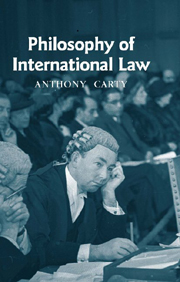Book contents
- Frontmatter
- Contents
- Preface and Acknowledgments
- 1 What Place for Doctrine in a Time of Fragmentation?
- 2 Continuing Uncertainty in the Mainstream
- 3 International Legal Personality
- 4 The Use of Force
- 5 American Legal Cultures of Collective Security
- 6 Marxism and International Law
- 7 Resistances to the Neoliberal International Economic Order
- 8 From an Order of Fear to One of Respect
- Index
6 - Marxism and International Law
Published online by Cambridge University Press: 12 September 2012
- Frontmatter
- Contents
- Preface and Acknowledgments
- 1 What Place for Doctrine in a Time of Fragmentation?
- 2 Continuing Uncertainty in the Mainstream
- 3 International Legal Personality
- 4 The Use of Force
- 5 American Legal Cultures of Collective Security
- 6 Marxism and International Law
- 7 Resistances to the Neoliberal International Economic Order
- 8 From an Order of Fear to One of Respect
- Index
Summary
Introduction
Rumors of the death of socialism have been, oddly enough, accompanied by rumors of the disappearance of the United States. Poststructuralists tell us that we are all victims now but that, somehow, the multitude will arise against ‘the Powers.’ Power enslaves us all in its impersonality, but resistance is everywhere. A primary focus of this study is Michael Hardt and Antonio Negri's Empire, a poststructuralist and, at the same time, postmarxist critique of globalization. This chapter will argue against those authors that an updated theory of capitalist imperialism convincingly captures the contemporary international scene. The brutal power of the United States is everywhere. It is infinitely destructive of international law. Postmodernism is the exhausted moral spirit of the old Europeans and the ghosts of Marxist interpretations of imperialism offer us the most convincing explanations as to why the violence of the United States increases by the year.
In this view Marxism does not offer a theory of international law as such but merely a contemporary, up-to-date explanation of why it is being systematically, or structurally, violated. Marxism is presented as a vision, an analysis of a condition, essentially pessimistic in its tracing of an increasing intensification of exploitation on a global scale, violently promoted and protected by the United States and its allies, the so-called ‘coalition.’ So, the contradictions of capitalism are reflected in the contradictions of international law.
- Type
- Chapter
- Information
- Philosophy of International Law , pp. 163 - 192Publisher: Edinburgh University PressPrint publication year: 2007



